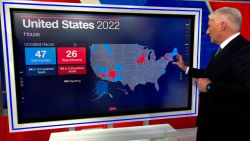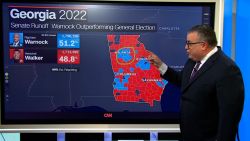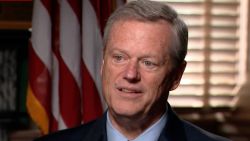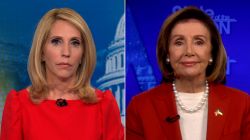The story of President Joe Biden’s Election Night can be told by the two congratulatory messages he delivered roughly four hours apart.
The first went to Rep. Abigail Spanberger of Virginia, the second to Pennsylvania Lt. Gov. John Fetterman. Together, the messages represented an initial signal of an electorate that appears set to buck decades of American voters delivering cascading midterm losses for a first-term president.
White House officials were cautious early Wednesday morning not to lay out definitive conclusions, keenly aware that votes would be counted in the days ahead. In a West Wing filled with campaign veterans, the idea of drawing definitive conclusions when votes were still being counted and key races remained uncalled was, as one official described, “a fool’s errand.”
But on several fronts, Biden advisers said they viewed the initial results as early-stage vindication that their multi-faceted messaging approach – one that had drawn criticism for not focusing more on the economy – may have landed more fulsomely than predicted.
“We have defied historical trends,” a senior Biden adviser told CNN. “It’s pretty extraordinary if you think about it.”
“Just a historic trend bucking,” another Biden adviser said.
There are millions of votes still to be counted and three toss-up races that hold the keys to the Senate majority remain uncalled. One of those – the Georgia Senate contest – will be decided in a runoff one month from now. Republicans still appear on the precipice of a taking the majority in the House, an outcome loaded with dramatically reshaped political, policy and investigatory implications that Biden and his advisers haven’t had to grapple with in their first two years.
But optimism in the White House about the Democratic pathway to hold onto the Senate was real – even if it was tempered by the reality the hardest-fought races still remained too close to call.
Multiple states with abortion-related ballot measures all looked headed toward victories for abortion rights advocates, underscoring the salience of an issue Democrats sought to leverage in the wake of the Supreme Court decision to strike down Roe vs. Wade.
Democrats facing off against election-denying Republicans in critical secretary of state races were also either victorious or hanging onto leads in races to be the top state-wide election official. Biden’s move to elevate the centrality of “democracy on the ballot” had drawn grumbles from some Democrats who were concerned it wasn’t a driver of voter sentiment.
And Democrats also held onto the governor’s mansion in three critical swing states – Michigan, Wisconsin and Pennsylvania – where falsehoods pushed by former President Donald Trump and his supporters about the 2020 election had been pervasive.
But it was Virginia’s 7th Congressional District and the US Senate race in Pennsylvania that truly made it clear: The midterm wipeout that had affected so many of Biden’s predecessors had not materialized.
A big win in the DC suburbs
Shortly before 10 p.m. ET, as Biden placed calls to an initial group of seven Democrats, Spanberger’s race was still viewed as too close to call. It was a race White House officials had quietly identified before Election Day as a harbinger of the night to come, and they were watching it closely.
Despite the close race not being called, Biden still offered his congratulations as the front-line Virginia Democrat started to widen her lead, giving the White House confidence the contest was heading in her favor.
For Biden, Spanberger’s win carried several layers of significance beyond its broader signal about the political environment. A moderate Democrat who flipped her district in the 2018 Democratic wave, Spanberger is, in the words of one Biden adviser, “a Biden kind of Democrat.”
She’s vocally pushed back against progressive proposals that animated the party in recent years, largely aligning with Biden’s more tempered view of Democratic policies. But she also delivered a scathing critique of Biden’s own sweeping domestic agenda in the closing days of what would become a victory in the reliably blue Virginia governor’s race last year.
“Nobody elected him to be F.D.R., they elected him to be normal and stop the chaos,” Spanberger was quoted saying in the New York Times.
The remarks caught Biden’s attention, and he soon asked to speak to Spanberger by phone. Within two months, he was in her district holding an official event, even as other front-line Democrats had taken clear steps to distance themselves from Biden’s sagging approval ratings.
As the race turned definitively, it marked a critical moment for Biden and his political team, which entered the night with the view that there was a pathway to hold the Democratic Senate majority. They had campaigned by hammering on Biden’s agenda and relentlessly framing the vote as a stark choice at hand, aiming to dampen growing talk of a red wave of Republican victories across the country.
Flipping a Senate seat in Pennsylvania
If Spanberger’s race marked the initial signs of a more positive night than predicted, it was Fetterman’s that provided the exclamation point.
With Democrats clinging to the narrowest of Senate majorities, the Pennsylvania seat held by retiring Republican Sen. Pat Toomey represented the only viable pickup opportunity in a handful of toss-up races that appeared primed to break either way.
That Fetterman is very publicly recovering from a stroke he suffered six months, including a debate performance that led some Democrats to question his decision to press forward, placed a cloud of uncertainty over a race in a state Biden flipped back to the Democratic column by a little more than 80,000 votes in 2020.
But unlike so many other hotly contested states and districts, Biden never hesitated to show up in his birth state – and Fetterman never avoided Biden when he did. That included the highest-profile Democratic campaign rally of the cycle this past weekend, where Biden and former President Barack Obama teamed up with Fetterman and Josh Shapiro, the party’s candidate for governor, to make one final run at juicing turnout in the Democratic stronghold of Philadelphia.
Biden left that rally bolstered by the enthusiasm he saw, one adviser told CNN – a personal data point of sorts for the self-identifying “congenital optimist” who never seemed unsettled by the Democratic anxiety that became pervasive in the final weeks of the campaign.
Yet he also didn’t hesitate to lay out his view of the stakes of the moment – one in which the Republican center of gravity had not shifted away from Trump in the two years since his electoral defeat.
“This is a defining moment for the nation,” Biden said as he neared the close of his Philadelphia remarks.
Even as Biden made congratulatory phone calls to 35 victorious Democrats, he remained behind closed doors. A White House official said his calls had been wrapped up for the night and, while there was nothing officially scheduled, the first opportunity to hear Biden’s views would likely come later on Wednesday.
At last, Fetterman’s race was called shortly after 1 a.m. ET Wednesday morning. Shortly after, a White House official passed along a simple message that wasn’t subtle in its nod to Biden’s repeated visits to Pennsylvania as other Democrats kept him at arm’s length.
“The president had a great time with the senator-elect on Saturday,” the official said.
Biden’s own electoral future will soon move to center stage, as he enters the critical period where he’ll make a final decision whether to seek reelection. Biden’s 2020 opponent, Trump, has already made moves toward his own campaign launch.
But for all of the uncertainty, Biden’s advisers ended the night assured that a sweeping red wave – and the implicit indictment of their administration from which they fought to separate themselves – did not materialize.
Biden, for his part, decided to reach out to one more Democrat before ending his night: He sent a text to Fetterman, congratulating him on his victory.
CNN’s MJ Lee and Jeremy Diamond contributed to this report.






















